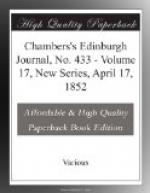’A classification of authors to suit all hours and weathers might be amusing. Ariosto spans a wet afternoon like a rainbow. North winds and sleet agree with Junius. The visionary tombs of Dante glimmer into awfuller perspective by moonlight. Crabbe is never so pleasing as on the hot shingle, when we look up from his verses at the sleepy sea, and count the
“Crimson
weeds, which spreading slow,
Or lie like pictures on the
sand below:
With all those bright red
pebbles, that the sun
Through the small waves so
softly shines upon.”
’Some books come in with lamps and curtains, and fresh logs. An evening in late autumn, when there is no moon, and the boughs toss like foam raking its way back down a pebbly shore, is just the time for Undine. A voyage is read with deepest interest in winter, while the hail dashes against the window. Southey speaks of this delight—
“’Tis pleasant
by the cheerful hearth to hear
Of tempests and the dangers
of the deep,
And pause at times and feel
that we are safe;
And with an eager and suspended
soul,
Woo terror to delight us.”
’The sobs of the storm are musical chimes for a ghost-story, or one of those fearful tales with which the blind fiddler in Redgauntlet made “the auld carlines shake on the settle, and the bits of bairns skirl on their minnies out frae their beds.”
’Shakspeare is always most welcome at the chimney-corner; so is Goldsmith: who does not wish Dr Primrose to call in the evening, and Olivia to preside at the urn? Elia affirms, that there is no such thing as reading or writing, but by a candle; he is confident that Milton composed the morning hymn of Eden with a clear fire burning in the room; and in Taylor’s gorgeous description of sunrise, he found the smell of the lamp quite overpowering.... But Elia,’ he says further on, ’carried his fireside theory too far. Some people have tried “the affectation of a book at noonday in gardens and sultry arbours,” without finding their task of love to be unlearnt. Indeed, many books belong to sunshine, and should be read out of doors. Clover, violets, and hedge-roses, breathe from their leaves; they are most lovable in cool lanes, along field-paths, or upon stiles overhung by hawthorn; while the black-bird pipes, and the nightingale bathes its brown feathers in the twilight copse.
’The sensation is heightened when an author is read amid the scenery or the manners which he describes—as Barrow studied the sermons of Chrysostom in his own see of Constantinople. What daisies sprinkle the walks of Cowper, if we take his Task for a companion through the lanes of Weston! Under the thick hedges of Horton, darkening either bank of the field in the September moonlight, Il Penseroso is still more pensive. And whoever would feel at his heart the deep pathos of Collins’s lamentation for Thomson, must murmur it to himself, as he glides upon the stealing wave, by the breezy lawns and elms of Richmond.’




